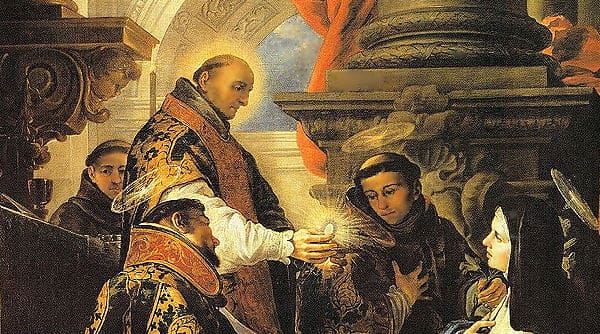Holy Communion Increases Sanctifying Graces
The Eucharist, as a sacrament, produces in you an increase of habitual, or sanctifying, grace by its own power. Its effects are like those of food: it maintains, increases, and repairs your spiritual forces, causing also a joy that is not necessarily felt, yet it is real.
Holy Communion not only preserves the life of your soul, but increases it, just as the body is not only supported by means of natural food, but increases in strength.
Holy Communion also preserves and increases all the various virtues, which are bestowed upon your soul together with sanctifying grace. By increasing the theological virtues (faith, hope, and charity), Holy Communion enables you to enter into closer union with God, and by strengthening the moral virtues (prudence, temperance, justice, and fortitude), Holy Communion enables you to regulate better your whole attitude toward God, your neighbor, and yourself. By rendering the seven gifts and the twelve fruits of the Holy Spirit more abundant, Holy Communion opens your understanding and will to the inspirations and promptings of the same Holy Spirit.
The Holy Spirit sanctifies souls by the supernatural gift of grace. The highest type of grace is sanctifying grace, which is a spiritual quality, dwelling in our soul, making it like God Himself. Our Lord spoke of the reception of this life as a spiritual birth when He said to Nicodemus, “Unless one is born anew, he cannot enter the kingdom of God.”
Sanctifying grace is also called habitual grace, because once we have received it, it remains as a habit in our soul. Once it has been received, sanctifying grace remains in the soul unless it is driven out by mortal sin.
The Holy Spirit is the skillful gardener. The root of the vine is the sinful soul. Through grace the Spirit gives it His divine life so that it may blossom forth into virtues.
Before our Lord went forth to His Passion, He left to His Apostles and to us all a last testament in His parting discourse. When His bodily presence had to be taken from us, He earnestly and repeatedly enjoined, “Abide in me.”
The bond uniting Him and you can be only a spiritual one, yet it is something real and living, something enduring, not passing, and rooted in the very essence of your being. He used the significant parable of the vine and branches to illustrate: “I am the vine, you are the branches. He who abides in me, and I in him, he it is that bears much fruit, for apart from me you can do nothing. If a man does not abide in me, he is cast forth as a branch and withers; and the branches are gathered, thrown into the fire and burned.”
The stem and the branches are one same being, nourished and acting together, producing the same fruits because fed by the same sap. In the same way Jesus and the faithful are united in one Mystical Body. He makes the sap of His grace to spring up within you, especially by means of Holy Communion, and thereby increases and develops the divine life of your soul.
Pope Pius XII in his encyclical letter on the Mystical Body of Christ says, “In the Holy Eucharist the faithful are nourished and strengthened at the same banquet and by a divine, ineffable bond are united with each other and with the Divine Head of the whole Body.” You will be able to say with St. Paul, “It is no longer I who live, but Christ who lives in me; and the life I now live in the flesh I live by faith in the Son of God, who loved me and gave Himself for me.”
To have sanctifying grace is the first, most essential, and abiding condition of union with Christ, and the basis of all gifts and powers that make up the spiritual life. This grace is a real, spiritual, and abiding faculty of your soul, a partaking in the divine nature and image of the divine Sonship in a spiritual manner, so that you become like Christ, who is the Son of God by nature. As long as sanctifying grace remains in you, He is and remains within you that you may be one in Him and in the Father, as They are one. “That they may all be one; even as Thou, Father, art in me, and I in Thee, that they also may be in us.” The Father and the Son are one by the possession of the same divine nature. You possess an image of that nature in sanctifying grace.
Surely you ought to be eager to go to Holy Communion often in order not to lose life everlasting. This is the greatest loss possible, for the smallest degree of sanctifying grace is worth more than anything that the world can offer. Even the greatest earthly happiness is nothing in comparison with that of possessing sanctifying grace and eternal life in God. Look into your soul, for Heaven’s beginning is there in the form of grace.
+
This article is from a chapter in The Basic Book of the Eucharist by Fr. Lawrence Lovasik which is available through Sophia Institute Press. 
Art for this post on sanctifying graces: Cover of The Basic Book of the Eucharist, used with permission. Detail of La [última] comunión de Santa Teresa (The (last) communion of Saint Teresa), Juan Martín Cabezalero, circa 1670, PD-US author’s life plus 100 years or less, Wikimedia Commons.




